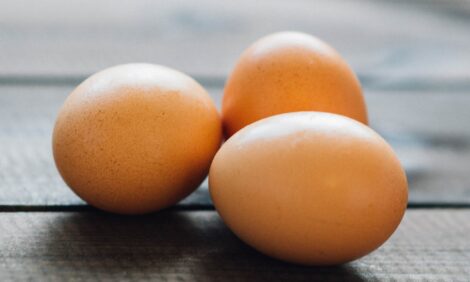



Mycoplasma Vaccination Pays off in Chinese Study
CHINA - Inoculation of commercial parent broiler chicken breeders with an F-strain Mycoplasma gallisepticum vaccine during rearing was effective in preventing field infections and improved performance in a recently published study.Inoculation of commercial parent broiler chicken breeders with an F-strain Mycoplasma gallisepticum (FMG) vaccine before laying may prevent infection by field M. gallisepticum, according to researchers based in Hefei, as well as improving productive and reproductive performance.
The influences of FMG vaccine inoculation during the pullet period on the subsequent productive and reproductive performance of parent broiler chicken breeders on a multi-age farm have been evaluated by J.J. Liu and collageus at Anhui Agricultural University.
In a paper published in Poultry Science, they explain that they randomly divided 3,000 breeders were into two treatment groups that were either vaccinated with FMG (FMG-vaccinated group) or not vaccinated with FMG (FMG-free group).
Body weight and egg production were determined through approximately 50 weeks of age. Egg weight and feed conversion was determined at 26, 32, 35, 38 and 43 weeks of age. Egg quality parameters, including eggshell strength, egg-specific gravity, egg shape index, blood-meat spots, Haugh unit score, eggshell thickness, yolk:albumen ratio, percentage yolk, albumen and eggshell weights and percentage fertility, hatchability, and second-quality chicks were determined at 26, 32 and 43 weeks of age. Air sacs were examined and lesions were scored at 20, 32 and 50 weeks of age. The number of mature ovarian follicles, histologies of ovary, and lengths and histologies of the infundibulum, magnum, isthmus, uterus, and vagina were determined.
In the present study, an increase in egg production of broiler breeder hens in the FMG-vaccinated group during peak of lay was compared with the FMG-free group.
Feed conversion of hens in the FMG-vaccinated group was significantly lower at 32, 35, 38 and 43 weeks of age.
Eggs from hens in the FMG-vaccinated group had a significantly higher Haugh units score at 26 weeks of age and had a significantly higher eggshell thickness and lower incidence of blood-meat spots at 32 weeks.
Hatching eggs from hens in the FMG-vaccinated group had a significantly higher hatchability.
The mean lesion score of air-sac lesion of birds in the FMG-vaccinated group was significantly lower than FMG-vaccinated group.
Uteruses of hens in the FMG-vaccinated group were significantly longer than the FMG-free group at 32 weeks of age.
Reference
Liu J.J., L. Ding, J.Z. Wei and Y. Li. 2013. Influences of F-strain Mycoplasma gallisepticum vaccine on productive and reproductive performance of commercial parent broiler chicken breeders on a multi-age farm. Poult. Sci. 92(6):1535-1542. doi: 10.3382/ps.2012-02999
Further Reading
You can view the full report by clicking here.
Find out more about Mycoplasma gallisepticum in chickens by clicking here.











